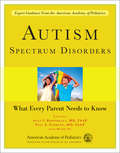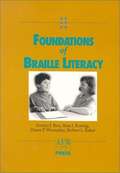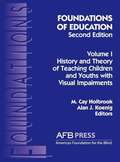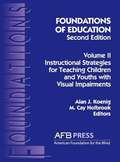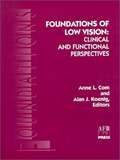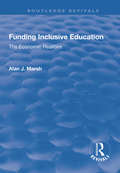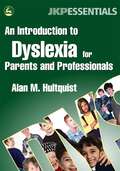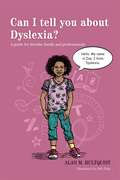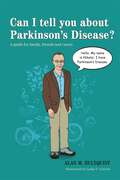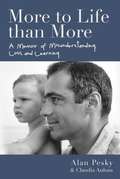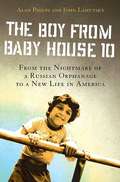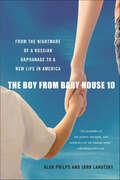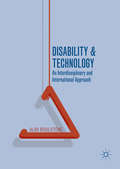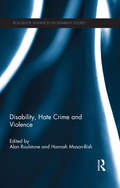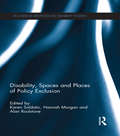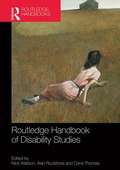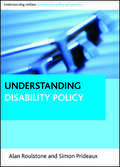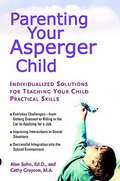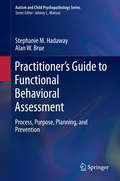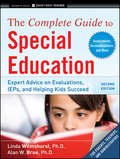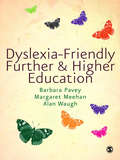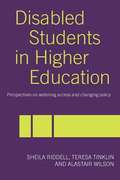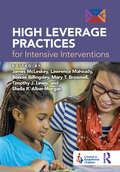- Table View
- List View
Autism Spectrum Disorders
by Paul S. Carbone Alan I. RosenblattAutism Spectrum Disorders: What Every Parent Needs to Know is an invaluable resource for parents and caregivers of children who have been diagnosed with an autism spectrum disorder (ASD). Prepared under the editorial direction of 2 distinguished pediatricians who are autism experts-one of whom is also the parent of a son with autism-this book helps you understand how ASDs are defined and diagnosed and provides you with information on the most current types of behavioral and developmental therapies. It also helps parents understand what they can do to help promote a smooth transition from adolescence through the teen years and into adulthood.Topics include Symptoms, frequency, and types of ASDs Accessing care Services in the community Tapping into educational resources Behavioral and developmental treatment The role of complementary and alternative medicine Screening tools Adolescence and beyondYou'll also find inspirational and supportive stories from other parents that will help you recognize that you're not alone on this journey. Autism Spectrum Disorders: What Every Parent Needs to Know provides you with tools to help navigate the sometimes challenging world of autism spectrum disorders.
Foundations of Braille Literacy
by Evelyn J. Rex Alan J. Koenig Diane P. Wormsley Robert L. BakerHistorical perspectives on literacy for blind people; changing views on teaching, reading and writing; approaches and strategies for reading and writing Braille literacy.
Foundations of Education: History and Theory of Teaching Children and Youths with Visual Impairments (Volume 1, 2nd Edition)
by Alan J. Koenig M. Cay HolbrookA new and complete revision of a landmark text. This comprehensive compilation of state-of-the-art information is the essential resource on educating visually impaired students, the essential theory forming the knowledge base, and methodology of teaching visually impaired students in all areas. This completely revised, updated edition reflects federal guidelines on educational programming, specialized assessment, and critical knowledge on the core curriculum and expanded core curriculum. A must-have for educators, administrators, policy makers, and allied in the visual impairment field!
Foundations of Education: Volume II
by Alan J. Koenig M. Cay HolbrookA new and complete revision of a landmark text. This comprehensive compilation of state-of-the-art information is the essential resource on educating visually impaired students, the essential theory forming the knowledge base, and methodology of teaching visually impaired students in all areas. This completely revised, updated edition reflects federal guidelines on educational programming, specialized assessment, and critical knowledge on the core curriculum and expanded core curriculum. A must-have for educators, administrators, policy makers, and allied in the visual impairment field!
Foundations of Low Vision: Clinical and Functional Perspectives
by Alan J. Koenig Anne L. CornThis text explains in great detail how to do low vision exams, the principles behind magnifiers and other forms of magnification, and much more.
Learning Media Assessment of Students With Visual Impairments: A Resource Guide for Teachers (Second Edition)
by Alan J. Koenig M. Cay HolbrookThe book guides the educators to identify the best possible reading format for a student - either through braille, objects, audio or combinations of these. This is an essential early step before undertaking the actual literacy education.
Funding Inclusive Education: The Economic Realities (Monitoring Change In Education Ser.)
by Alan J. MarshThis title was first published in 2003.Funding for pupils with special educational needs has created resource management difficulties for schools and budgetary control problems for LEAs. Special educational needs is a frequent area of LEA overspending. These issues are particularly important as the development of inclusion and raising attainment for all pupils are key Government priorities. Many LEAs are now considering revisions of their funding formulae for additional and special educational needs during Best Value Reviews and Fair Funding consultations. This stimulating and accessible book examines the policy context for formula funding and the design and accountability issues for the construction of a revised formula. One of the central themes is the idea that a funding formula should be viewed as a key instrument of policy to assist in delivering specific inclusive policy objectives to meet the additional and special educational needs of pupils.
An Introduction to Dyslexia for Parents and Professionals
by Alan M. Hultquist'This book does exactly what it says on the tin! Hultquist deals with the causes, types and sub types of dyslexia. He explains how dyslexia is diagnosed and remediated and gives appendices on agencies, resources and practical classroom strategies. I would highly recommend this book to parents who have just received a dyslexia diagnosis in the family, to professionals working with those with dyslexia and to specialist teachers to have as a handy reference/refresher tool. For all these audiences, Hultquist writes in such measured, clear and uncluttered prose that no one can take the journey from diagnosis to remediation without feeling that one is in the hands of someone who really understands the issues surrounding a dyslexia diagnosis, not only for the one diagnosed but also for the whole family and the professionals working with them.' - Dyslexia Contact 'This short, to - the- point book is an absolute "must buy" for any parent with a child with dyslexia, or any teacher with a child with dyslexia in her class. I asked a parent of a child with dyslexia to read this book and give me an honest opinion. Her reply is as good a recommendation as any review I can write: "I could see my son straight away. I now understand why he has particular reading and writing difficulties. I hope his teacher reads this book and is able to take note of this author's advice.".' - Special Children Magazine 'This is only a short book, but it is a model of consciousness and clarity. It covers much ground and should fulfill its purpose as an introduction for both parents and teachers who wish to increase their understanding of dyslexia.' -The School Librarian Journal This practical guide provides basic need-to-know information for parents and professionals and answers frequently asked questions about dyslexia. Using illustrative case studies, Alan M. Hultquist addresses many of the issues surrounding dyslexia, including possible causes and subtypes, means of testing, remediation and the controversial matter of "staying back" to repeat a school year. He identifies possible methods of classroom accommodation for dyslexic students in a range of subject areas. The list of useful resources at the back of the book can be used by parents and professionals to help explain dyslexia to children, and to help them find further information and teaching tools. This complete introductory guide to dyslexia is a must-read for parents of children with dyslexia, especially parents with children who are newly diagnosed, and for all those who work with dyslexic children and their families.
Can I tell you about Dyslexia?: A guide for friends, family and professionals
by Alan M. Hultquist Bill TulpMeet Zoe - a young girl with dyslexia. Zoe invites readers to learn about dyslexia from her perspective. She helps readers to understand the challenges faced by a child with dyslexia, explaining what dyslexia is and how it affects her at home and at school. Zoe describes exactly why she finds reading, writing and words so difficult, and how other people can help her in these areas. This illustrated book is ideally suited for readers aged 7 and upwards, and will be an excellent way to start a discussion about dyslexia, in the classroom or at home.
Can I tell you about Parkinson's Disease?: A guide for family, friends and carers
by Alan M. Hultquist Lydia CorrowMeet Nikolai - a man with Parkinson's disease. Nikolai invites readers to learn about Parkinson's from his perspective, helping them to understand how Parkinson's affects his daily life and why some tasks can be especially challenging for him. He also gives advice on how to help someone with Parkinson's when they have difficulties with physical movements and memory. This illustrated book is full of useful information and will be an ideal introduction for children from the age of 7, as well as older readers. It will help family, friends and carers better understand and explain the condition, and will be an excellent starting point for group discussions.
More to Life than More: A Memoir of Misunderstanding, Loss, and Learning
by Alan Pesky Claudia AulumAt the age of thirty, just as everything was falling into place for him, Lee Pesky died of brain cancer. For his father, Alan, grief came with the realization that he had lost the chance to love Lee as he was—not as he wanted him to be. Ambitious, successful, and always striving for more, Alan had a hard time relating to a son who struggled with learning disabilities at a time when there was little understanding or help for kids who had them. Their relationship was complicated, and now, Lee was gone.More to Life than More is a memoir of misunderstanding, loss, and learning. After Lee&’s death, Alan&’s conception of more crumbles. He launches himself into keeping Lee&’s memory alive by helping kids in a way he wasn&’t able to help his son. It was too late to change his relationship with Lee, but he could create something positive and enduring from his loss: Lee Pesky Learning Center, a non-profit in Idaho dedicated to understanding and helping those with learning differences.In 25 years, LPLC has benefited more than 100,000 children and has become a national force for early childhood literacy. And for Alan, it has meant getting to know the son he had misunderstood and lost.
The Boy From Baby House 10: From the Nightmare of a Russian Orphanage to a New Life in America
by Alan Philps John LahutskyIn 1990, a young boy afflicted with cerebral palsy was born, prematurely, in Russia. His name was Vanya. His mother abandoned him to the state childcare system and he was sent to a bleak orphanage called Baby House 10. Once there, he entered a nightmare world he was not to leave for more than eight years. Housed in a ward with a group of other children, he was clothed in rags, ignored by most of the staff and given little, if any, medical treatment. He was finally, and cruelly, confined for a time to a mental asylum where he lived, almost caged, lying in a pool of his own waste on a locked ward surrounded by psychotic adults. But, that didn't stop Vanya. Even in these harsh conditions, he grew into a smart and persistent young boy who reached out to everyone around him. Two of those he reached out to-Sarah Philps, the wife of a British journalist, and Vika, a young Russian woman-realized that Vanya was no ordinary child and they began a campaign to find him a home. After many twists and turns, Vanya came to the attention of a single woman living in the United States named Paula Lahutsky. After a lot of red tape and more than one miracle, Paula adopted Vanya and brought him to the U. S. where he is now known as John Lahutsky, an honors student at Freedom High School in Bethlehem, Pennsylvania and a member of the Boy Scouts of America Order of the Arrow. In The Boy From Baby House 10, Sarah's husband, Alan Philps, helps John Lahutsky bring this inspiring true-life story of a small boy with a big heart and an unquenchable will to readers everywhere.
The Boy from Baby House 10: From the Nightmare of a Russian Orphanage to a New Life in America
by Alan Philps John LahutskyIn 1990, a young boy afflicted with cerebral palsy was born, prematurely, in Russia. His name was Vanya. His mother abandoned him to the state childcare system and he was sent to a bleak orphanage called Baby House 10. Once there, he entered a nightmare world he was not to leave for more than eight years. Housed in a ward with a group of other children, he was clothed in rags, ignored by most of the staff and given little, if any, medical treatment. He was finally, and cruelly, confined for a time to a mental asylum where he lived, almost caged, lying in a pool of his own waste on a locked ward surrounded by psychotic adults. But, that didn't stop Vanya. Even in these harsh conditions, he grew into a smart and persistent young boy who reached out to everyone around him. Two of those he reached out to—Sarah Philps, the wife of a British journalist, and Vika, a young Russian woman—realized that Vanya was no ordinary child and they began a campaign to find him a home. After many twists and turns, Vanya came to the attention of a single woman living in the United States named Paula Lahutsky. After a lot of red tape and more than one miracle, Paula adopted Vanya and brought him to the U.S. where he is now known as John Lahutsky, an honors student at Freedom High School in Bethlehem, Pennsylvania and a member of the Boy Scouts of America Order of the Arrow. In The Boy From Baby House 10, Sarah's hus band, Alan Philps, helps John Lahutsky bring this inspiring true-life story of a small boy with a big heart and an unquenchable will to readers everywhere.
A Boy and a Jaguar
by Catia Chien Alan RabinowitzAlan loves animals, but the great cat house at the Bronx Zoo makes him sad. Why are they all alone in empty cages? Are they being punished? More than anything, he wants to be their champion--their voice--but he stutters uncontrollably.Except when he talks to animals...Then he is fluent. This real-life story with tender illustrations by Catia Chien explores truths not defined by the spoken word. <br><b>2015 Schneider Family Book Award Winner </b>
Disability and Technology
by Alan RoulstoneThis book brings together formally disparate literatures and debates on disability and technology in a way that captures the complex interplay between the two. Drawing on disability studies, technology studies and clinical studies, the book argues that interdisciplinary insights together provide a more nuanced and less stylized picture of the benefits and barriers in disability and technology. Drawing on a breadth of empirical studies from across the globe, a picture emerges of the complex and multi-directional interplay of technology and disability. Technology is neither inherently enabling or disabling but fundamentally shaped by the social dynamics that shape their design, use and impact.
Disability, Hate Crime and Violence (Routledge Advances in Disability Studies)
by Alan Roulstone Hannah Mason-BishThis book provides a comprehensive and interdisciplinary examination of disability, hate crime and violence, exploring its emergence on the policy agenda. Engaging with the latest debates in criminology, disability and violence studies, it goes beyond conventional notions of hate crime to look at violences in their myriad forms as they are seen to impact upon disabled people’s lives. Despite a raft of relevant policy and legislation, few have attempted to draw together research on the disabled as victims of hate crime and violence. This innovative volume conceptualizes issues of disability, hate crime and violence and connects empirical research with theoretical insights. Making links between criminal justice policy, social care and welfare, it highlights areas of best practice and makes suggestions for policy and legislative reform. Disability, Hate Crime and Violence is written in accessible language, with minimal jargon and an international focus. Each chapter is grounded in research and practice, with relevant policy and legislation clearly signposted throughout. Disability, Hate Crime and Violence provides a much needed theoretical and practical investigation of the key issues around disabled hate crime and violence. It is an important work for students and academics researching and studying in disability studies, criminology, social policy and sociology, as well as those with an interest in domestic violence studies and broader historical and philosophical constructions of disability, violence and social harms.
Disability, Spaces and Places of Policy Exclusion (Routledge Advances in Disability Studies)
by Alan Roulstone Karen Soldatic Hannah MorganGeographies of disability have become a key research priority for many disability scholars and geographers. This edited collection, incorporating the work of leading international disability researchers, seeks to expand the current geographical frame operating within the realm of disability. Providing a critical and comprehensive examination of disability and spatial processes of exclusion and inclusion for disabled people, the book uniquely brings together insights from disability studies, spatial geographies and social policy with the purpose of exploring how spatial factors shape, limit or enhance policy towards, and the experiences of, disabled people. Divided into two parts, the first section explores the key concepts to have emerged within the field of disability geographies, and their relationship to new policy regimes. New and emerging concepts within the field are critically explored for their significance in conceptually framing disability. The second section provides an in-depth examination of disabled people’s experience of changing landscapes within the onset of emerging disability policy regimes. It deals with how the various actors and stakeholders, such as governments, social care agencies, families and disabled people traverse these landscapes under the new conditions laid out by changing policy regimes. Crucially, the chapters examine the lived meaning of changing spatial relations for disabled people. Grounded in recent empirical research, and with a global focus, each of the chapters reveal how social policy domains are challenged or undermined by the spatial realities faced by disabled people, and expands existing understandings of disability. In turn, the book supports readers to grasp future policy directions and processes that enable disabled people's choices, rights and participation. This important work will be invaluable reading for students and researchers involved in disability, geography and social policy.
Routledge Handbook of Disability Studies
by Carol Thomas Alan Roulstone Nick WatsonThe Routledge Handbook of Disability Studies takes a multidisciplinary approach to disability and provides an authoritative and up-to-date overview of the main issues in the field around the world today. Adopting an international perspective and consisting entirely of newly commissioned chapters arranged thematically, it surveys the state of the discipline, examining emerging and cutting edge areas as well as core areas of contention. Divided in five sections, this comprehensive handbook covers: different models and approaches to disability how key impairment groups have engaged with disability studies and the writings within the discipline policy and legislation responses to disability studies and to disability activism disability studies and its interaction with other disciplines, such as history, philosophy and science and technology studies disability studies and different life experiences, examining how disability and disability studies intersects with ethnicity, sexuality, gender, childhood and ageing. Containing chapters from an international selection of leading scholars, this authoritative handbook is an invaluable reference for all academics, researchers and more advanced students in disability studies and associated disciplines such as sociology, health studies and social work.
Understanding Disability Policy (Understanding Welfare: Social Issues, Policy and Practice series)
by Alan Roulstone Simon PrideauxIn an era of scarce social resources the question of the changing social policy constructions and responses to disabled people has become increasingly important. Paradoxically, some disabled people are realising new freedoms and choices never before envisioned, whilst others are prey to major retractions in public services and aggressive attempts to redefine who counts as 'genuinely disabled'. Understanding disability policy locates disability policy into broader social policy and welfare policy writings and goes beyond narrow statutory evaluations of welfare to embrace a range of indicators of disabled people's welfare. The book critically explores the roles of social security, social support, poverty, socio-economic status, community safety, official discourses and spatial change in shaping disabled people's opportunities. It also situates welfare and disability policy in the broader conceptual shifts to the social model of disability and its critics. Finally it explores the possible connection between changing official and academic constructions of disability and their implications for social policy in the 21st century. The book is supported by a companion website, containing additional materials for both students and lecturers using the book, which is available from the link above.
Parenting Your Asperger Child
by Cathy Grayson Alan SohnAsperger's Syndrome is a form of autism--but with the right guidance, these children can go on to live happy, fulfilling lives. In Parenting Your Asperger Child, Dr. Alan Sohn's and Cathy Grayson's groundbreaking Cognitive Social Integration Therapy (CSIT) offers practical solutions that help parents prepare their children for a fulfilling life of social interaction outside the confines of their syndrome, addressing such topics as: - The six characteristics of Asperger's Syndrome - How to identify a child's type of Asperger's--and the best approaches for dealing with it - Understanding how an Asperger's child sees and interprets the world - Replacing inappropriate coping techniques with productive skills - How to survive and learn from a crisis - How school programs can aid in teaching Asperger children - Making changes that last
Practitioner's Guide to Functional Behavioral Assessment
by Alan W. Brue Stephanie M. HadawayThis practical guide introduces functional behavioral assessment as a critical tool in planning interventions to reduce disruptive and other problematic behaviors. The book offers proven methods and strategies as a four-stage protocol in an easy-to-follow format with checklists, Q&A sections, applications, and an extended case example including an assessment report and intervention plan. Step-by-step instructions are delivered in an accessible teaching style, making all phases of assessment equally manageable. And although functional behavioral assessment is typically associated with schoolchildren, this material is also useful for working with adults in residential and community settings. The Guide gives readers: The basics of functional behavioral assessment. Guidance in preparing for conducting a functional behavioral assessment. An overview of assessment methods: formal and informal measures, interview, and observation. A framework for translating assessment data into an appropriate intervention plan. In-depth understanding of the role of prevention in behavioral intervention. A kit of questionnaires, worksheets, and other ready-to-use resources. Practitioner's Guide to Functional Behavioral Assessment is an essential resource for clinicians and related professionals as well as researchers and graduate students in school and clinical child psychology; behavior therapy; assessment, testing and evaluation; special education; and educational psychology.
The Complete Guide to Special Education
by Linda Wilmshurst Alan W. BrueProvides an insider's view of the special education process for parents and teachersThis book explores the special education process-from testing and diagnosis to IEP meetings and advocating for special needs children. Step by step the authors reveal the stages of identification, assessment, and intervention, and help readers to better understand special needs children's legal rights and how to become an active, effective member of a child's educational team. Grounded in more than twenty-five years of working with parents and educators, the authors provide significant insight into what they have learned about the special education. This book fills the gap in the literature for the millions of children receiving special education services and the parents who are clamoring for information on this topic.Includes valuable tools, checklists, sample forms, and advice for working with special education studentsDemystifies the special education process, from testing and diagnosis to IEP meetings and advocating for childrenNew editions covers Response-to-Intervention (RTI), a new approach to diagnosing learning disabilities in the classroom; expanded coverage of autism spectrum disorders and bipolar disorder; and a revamped Resources section.
Dyslexia-Friendly Further and Higher Education
by Barbara Pavey Margaret Meehan Alan WaughWritten by authors with extensive experience of working with students with dyslexia, this book provides clear guidance and practical strategies for dyslexia-friendly practice for those working with young people aged 14 to 19 and adults in education or work-based training. Looking at how dyslexia impacts on learning, the authors suggest ways to improve the learning environment and explain how to help students develop the basic skills that will help them to make the transition from study to employment. Building on the latest research and understanding of dyslexia, they also consider overlapping characteristics, emotional and social issues and funding. The book includes: - visual chapter summaries - case studies drawn from practice - ideas for dyslexia-friendly written work, and lab and bench work - international perspectives - a selection of resources - model lesson plans and useful checklists This is essential reading not only for those studying dyslexia-focused programmes at Master's level, but also for mainstream practitioners wishing to improve their dyslexia knowledge and practice, and an ideal resource for professionals working in a school, college, university or adult setting, or delivering training and consultancy in this field. Barbara Pavey is a Senior Lecturer in Education at York St John University. Margaret Meehan is the Dyslexia Coordinator at Swansea University. Alan Waugh is Programme Area Manager for Additional Support at City College, Coventry.
Disabled Students in Higher Education: Perspectives on Widening Access and Changing Policy
by Sheila Riddell Teresa Tinklin Alastair WilsonThe authors present results gleaned from eight higher education institutions in Great Britain which demonstrate the level of participation by disabled students.
High Leverage Practices for Intensive Interventions
by Mary T. Brownell Timothy J. Lewis James McLeskey Bonnie Billingsley Lawrence Maheady Alber-Morgan, Sheila R.High Leverage Practices for Intensive Interventions provides special education teachers with descriptions and practical instructions on how to use High Leverage Practices (HLPs) to improve student outcomes. Since many students with disabilities spend their school day in inclusive general education classrooms, these intensive interventions are often delivered in separate or tier 3 settings to meet the students’ individualized needs. Each chapter focuses on a specific High Leverage Practice with explanations of its purpose and essential components, accompanied by examples for use with small groups of students or the individual student. This accessible and comprehensive guide is key for pre-service teachers in special education programs or those who provide intensive interventions with students.
